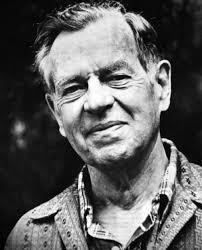“Opportunities to find a deeper strength within ourselves come when life seems most challenging” – Joseph Campbell
Joseph John Campbell (March 26 , 1904 – October 30 , 1987) was a professor of mythology and writer. In addition, he gave many lectures until just before his death. He became best known as a connoisseur of myths and comparative religious studies and philosophy of religion. He left behind a large body of work, covering many aspects of human experience. His way of thinking is often summed up in his life motto Follow Your Bliss, or “Follow your heart”.
The John Joseph Campbell Foundation: https://www.jcf.org/
Work
James Joyce and other early work
As made clear above, James Joyce had a great influence on Campbell. Campbell’s first major book (written with Henry Morton Robinson), A Skeleton Key to Finnegans Wake [3] (1944), consists of a critical analysis of the final text of Joyce’s Finnegans wake. His shortly followed pen fruit, The Hero with a Thousand Faces, is about what Campbell called the monomyth — the hero‘s cyclical journey, an idea he borrowed directly from Joyce’s Finnegans Wake[4].
Het Mask of God
His colossal four-volume work The Masks of God covers mythology all over the world, from antiquity to modern times. Where The Hero with the Thousand Faces mainly focused on the similarities in mythology (the “elementary ideas”), his Masks of God focuses more on the historical and cultural variations that the monomythe gets (the “ethnic ideas”). In other words, where The Hero with the Thousand Faces may make more connections to psychology, the Masks of God mainly makes the link to anthropology and history. The four parts of Masks of God have the following titles: Primitive Mythology, Oriental Mythology, Occidental Mythology, and Creative Mythology.
The historical atlas of world mythology
When he died, Campbell was working on a large-format, richly illustrated series titled The Historical Atlas of World Mythology. This series would be Campbell’s idea, which he first presented in The Hero with the Thousand Faces, namely that myths have developed in 4 stages:
• The Way of Animal Powers — the myths of paleolithic hunter-gatherer cultures, which were particularly concerned with shamanism and animal totems.
• The Way of the Fertilized Earth — the myths of Neolithic agricultural cultures, especially focused on a mother goddess and its fertility rites.
• The Way of Heavenly Lights — the myths of the Bronze Age city-states, with pantheons full of gods ruling from the heavens and led by a male god-king.
• The Way of Man — religion and philosophy, as they developed after the Pivotal Age (about 800 to 200 BC), in which the mythical imagery of the past times was consciously made metaphorical and reinterpreted as referring to a spiritual-spiritual, not literally historical matter. This transition can be seen in the East in Buddhism, the Vedic religions and in philosophical Taoism; and in the West at the Mystery cult, Platonism and Gnosticism.
Only 2 parts were finished when Campbell died.
On October 30, 1987, Joseph Campbell died of esophageal cancer at the age of 83 at his home in Honolulu, Hawaii, shortly after he and Bill Moyers completed the film adaptation of Myths and Consciousness (The Power of Myth).
(26 March 1904 – 30 October 1987) Joseph Campbell was an American professor, writer, and orator of American mythology, best known for his work on comparative mythology and comparative religion. During his stay in Europe, he was strongly influenced by the period of the Lost Generation, a time of enormous intellectual and artistic innovation. Campbell was also introduced to the work of Thomas Mann, who would prove influential on his life and ideas. Also in Europe, Campbell became acquainted with modern art and became particularly enthusiastic about the work of Paul Klee and Pablo Picasso. While studying in Europe, a new world of exciting ideas opened up for Campbell. Here he also discovered the works and writings of Sigmund Freud and Carl Jung. It was also during this time that he met and befriended the young Jiddu Krishnamurti, a friendship that began his lifelong interest in Hindu philosophy and mythology. Moreover, after the death of Indologist Heinrich Zimmer, Campbell was tasked with editing Zimmer’s papers and publishing them posthumously.
source: wikipedia https://nl.wikipedia.org/wiki/Joseph_Campbell

